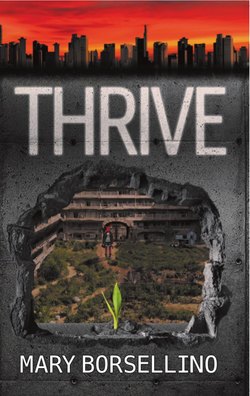Читать книгу Thrive - Mary Borsellino - Страница 15
На сайте Литреса книга снята с продажи.
11
ОглавлениеVisiting Sam becomes something Olivia looks forward to right from the moment she wakes up in the morning. It gets her through boring classes, through bullies shoving and pushing and calling her nasty things.
It's not the books — though she loves the books and is infinitely grateful for them, and will happily skip buying lunch for the rest of her life in order to afford them — it's Sam himself. Hannah was the first real friend Olivia ever had, and Sam's the only person she's met since who could be the second.
The room where he lives, upstairs from the café, is always a complete mess, but a comfortable mess. His clothes are all soft and worn and made of fine, smooth textures, so all the piles on the floor in his room are nice to sit on.
'I don't like anything rough or itchy or bright,' he explains, frowning as if even the thought of it makes him feel bad.
Olivia, remembering the wool coat left behind in the cell, thinks Sam's attitude is an eminently reasonable one.
Sam's hobby is drawing shapes with many sides, laid out in orthographic projections. The mathematician in her is enchanted by the clean poetry of his lines. The diagrams remind Olivia of honeycombs.
'A three-dimensional shape with twenty sides is an icosahedron,' Sam explains, pointing imperiously at one of the pictures which decorate his walls. His pictures help him with his words, because the desire to explain them to Olivia is strong enough that he makes the effort. 'It has thirty edges and twelve vertices. Twenty triangles all the same size in five rows of four can be folded up to make an icosahedron.'
She likes to watch Sam draw his projections. His movements are so precise, his concentration intense. It's like watching a tailor at work. The creation of a whole from small, exact pieces, placed together with talent and skill.
But more than that, she likes to fight about poetry with him. Maybe that's cliché — being a girly girl, talking about pretty words — but Olivia doesn't care.
Sometimes when they're both lounging on the futon in his room, or sitting on the sidewalk early in the morning before she goes to school, Olivia lets Sam play with her messy, uneven hair. In those moments, she asks him to recite parts of plays and epics, or to tell her what the structures of stories mean.
'The great Greek plays are tragedies,' Sam says, his fingertips smoothing back a loose lock of hair behind her ear. She's resting her head against his shoulder, her reader full of textbooks abandoned on her lap. His T-shirt is soft under her cheek. Olivia wishes that the moment could last forever and ever.
'The tragedy has to come from a terrible error the hero makes. That's what Aristotle says. The word is hamartia, which is usually translated as "tragic flaw". But that isn't what it means. It just means one mistake. One mistake that ruins everything.
'Tragedy gives the audience catharsis — release, relief. We're healed through the experience of watching characters go through suffering and pain.'
Olivia frowns. 'That's not a very good theory; not for applying across a whole medium. Why do we have to find healing in a story about somebody being broken? Can't we find healing in a story about somebody, you know, healing?'
'Howard Barker — he was a British playwright — said that tragedy equips you against lies, but after a musical you're anybody's fool.'
Olivia smacks Sam's chest, making a noise of outrage. 'You can't get away with calling me a fool just by attributing the words to someone else, jerk. And I still say I'm right. Tragedies never feel complete to me. They're stories that don't have a third act.'
'Just because you don't like the ending doesn't mean it's not an ending,' Sam replies, flat-toned but in good humour. It's an old argument, one they enjoy too much to ever agree about.
'Yes it does,' Olivia fires back, sitting up properly so she can look Sam in the eye. 'Sad endings being treated as automatically profound is so sophomoric-'
'To be fair, you are a sophomore.'
She ignores the interruption. 'And it's just wrong. Things start out all right, then they go bad, and then they're supposed to get better. That's how stories are meant to go. Otherwise you're ending Star Wars with The Empire Strikes Back.'
'In tragedy's defence, a lot of people would be perfectly happy if Star Wars did exactly that,' Sam jokes, deadpan. 'And tragedies are exactly right, for what they are.'
'But what they are is wrong.'
Sam gives a shrug. 'They can't help that.'
